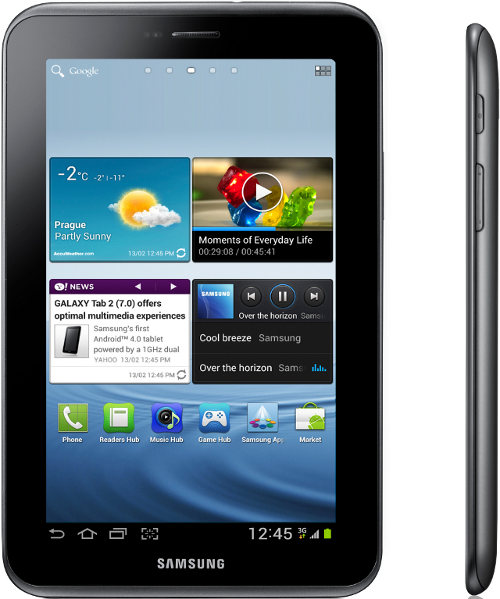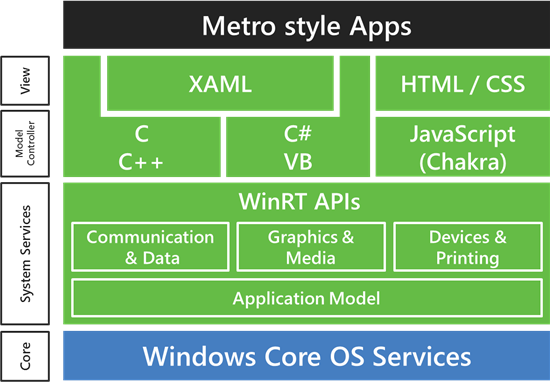Samsung has just announced its first Tablet to run Android 4.0 (ICS), the Galaxy Tab 2. The tablet features a dual core 1GHz processor with a 7″ touchscreen display (resolution 1024×600), 1GB RAM and 8, 16 or 32 GB flash expandable via a microSD Slot. There are also front and rear (3MPixel) cameras. Here are Samsung GALAXY Tab 2 (7.0) Product Specifications: Network HSPA+ 21Mbps 850/900/1900/2100 Processor 1 GHz Dual-Core Processor Display 7” WSVGA(1024×600) PLS TFT OS Android 4.0(ICS) Camera Main(Rear): 3 Megapixel Fixed Focus CameraSub(Front): VGA for Video Call Video Codec: MPEG4, H.263, H.264, VC-1, DivX, WMV7, WMV8, VP8Format: 3GP, ASF, AVI, MP4, WMV, FLV, MKV, WebM Playback/ Recording: Full HD@30fps, HD@30fps Audio Codec: MP3, AAC, AC-3, AMR, FLAC, MID, WMA, WAV, VorbisMusic Player with SoundAlive 3.5mm Ear Jack Value-added Features Samsung TouchWiz/ Samsung L!ve Panel UX Samsung Apps Samsung Kies / Samsung Kies air Samsung Hub* – Readers Hub/ […]
Raspberry Pi Linux Distribution: Raspberry Pi Fedora Remix 14
Several operating systems will be able to run on the Raspberry Pi boards. However, the Raspberry Foundation had announced that they were working with Red Hat to deliver a Fedora release optimized for the board and Broadcom BCM2835 processor (ARMv6 + hard-float support). It appears the full name of this distribution is “Raspberry Pi Fedora Remix 14” most probably based on Fedora 14 (as the name implies), and not the latest Fedora 16 release. This Linux distribution will officially be launched on the 22nd of February 2012 at the Seneca Centre for the Development of Open Technology in Toronto, Canada during a 2-hour event (15:00-17:00) featuring: A hands-on opportunity to use a Raspberry Pi Live demonstrations of the Raspberry Pi Fedora Remix software Examples of the educational uses of the Raspberry Pi The 60-computer build farm used to build the Fedora ARM software on which the remix is based Information […]
armStoneA8: 49 Euros ARM Cortex-A8 Single Board Computer
F&S Elektronik Systeme GmbH, a German company, has announced the armStoneA8 , a Single Board Computer (SBC) based on an ARM Cortex A8 that will be available by the first day of the Embedded World 2012 Conference. The great part is that for a limited period (27 February 2012 to 4 March 2012) you’ll be able to buy the board for 49 Euros on their (yet to be launched) online shop. The board, that comes in PicoITX form factor (100 x 72mm), is powered by a Cortex A8 CPU running at 1GHz and the company provides support for Linux, WinCE 6.0 and Windows Embedded Compact 7. The company says the bootloader, SDK, BSP and kernels are already available with support for DirectX, OpenGL and hardware accelerated GStreamer. The company plans to release the detailed specifications before Embedded World 2012, but in the meantime, I found some PDF about the board […]
Embedded World Conference 2012 Schedule
The Embedded World Conference 2012 will taken place on the February 28 – March 1 in Nuremberg, Germany. There will be over 1,000 exhibitors for the tenth conference (it started in 2003) showcasing their new products and solutions for the embedded markets. Beyond the exhibition, there will also be 13 classes and 22 sessions during those 3 days. February 28th 2012 Classes: 09:30 – 15:30 – Modeling Behavior with UML: Interactions and Statecharts by Dr. Bruce Douglass, IBM 16:00 – 17:00 – Agile Systems Engineering by Dr. Bruce Douglass, IBM 09:30 – 18:00 – Introduction to Real-Time Operating Systems by Dr. David Kalinsky, D. Kalinsky Associates 09:30 – 18:00 – Hands-on-Workshop Safety Critical Linux – Automated debugging and code screening with formal methods by Prof. Nicholas Mc Guire, OSADL Safety Critical Linux Working Group and Andreas Platschek, OpenTech. 09:30 – 16:30 – Cryptography and embedded Security – The Workshop chaired […]
Using Your Android Smartphone As A Desktop Computer
I’ve already written some posts with videos showing the many things you could do with your smartphone thanks to MHL Technology. Christian Qantrell (YouTube User) uploaded a video on YouTube where he connected his smartphone to a monitor with a MHL cable showing how it could be used as a desktop computer. I really like his setup with a Samsung Galaxy Nexus (Android 4.0) smartphone connected to a monitor with an MHL adapter (Micro-USB to HDMI) and Apple Bluetooth keyboard and (Magic) trackpad. He also mentioned external power, but this should not be needed if his monitor supported MHL. The Apple trackpad makes it very neat as it tracks the finger movements as it would if you used the smartphone touchscreen. He showed web browsing and music playback and said gmail works great. Thanks to the multi-touch trackpad, pinch and zoom also works. Overall, the user experience feels pretty good. […]
ARM Mali-200 and Mali-400 GPU Open Source Driver Released
There has been a lot of controversy around GPU drivers and open source, as GPU drivers usually come with a blob (a binary file). If you have been lurking in Raspberry Pi forums you’ll know what I mean. But this will change thanks to Lima. No, not the capital of Peru but the open source graphics driver for ARM Mali GPUs (Mali-200 and Mali-400) also called Lima whose goal is stated as follows: The aim of this driver is to finally bring all the advantages of open source software to ARM SoC graphics drivers. Currently, the sole availability of binary drivers is increasing development and maintenance overhead, while also reducing portability, compatibility and limiting choice. Anyone who has dealt with GPU support on ARM, be it for a Linux with a GNU stack, or for an Android, knows the pain of dealing with these binaries. Lima is going to solve […]
Microsoft Provides Windows 8 On ARM Technical Details
Steven Sinofsky, President of the Windows Division at Microsoft, has written a long blog post entitled “Building Windows for the ARM processor architecture” where he explains how Windows On ARM (WOA) will be deployed, the steps they took to develop it and what developers can do to program or port existing apps to Windows 8. Here are some keys and interesting points I noted: WOA and Windows 8 for x86/64 PCs will ship at the same time and the user experience should be the same for consumers on both platform. WOA PCs will be powered by Texas Instruments, Nvidia and Qualcomm processors. Microsoft will release an Unified OS Binary for WOA – That means one binary will run on all platforms (be it TI, Nvidia or Qualcomm). That seems impressive, and something Linux is not capable of, although much work is done on that and a unified linux kernel should […]
Android Kernel Source Released for HP TouchPad
The CyanogenMod team has been working on an Android port for the HP TouchPad for a while, and although good progress has been made, the firmware is still considered alpha due to issues with hardware and driver support. There are 2 versions: CM 7 (Alpha) with Android 2.3 and CM 9 (Alpha) with Android 4.0. The CM7 version is more complete and stable than CM9. The Android port might be sped-up as following pressure from the developer community, Hewlett Packard has released the Android kernel source and some other GPL packages modified for the HP TouchPad. Apparently, HP used those for factory testing. The source code is available on github at https://github.com/dalingrin/hp-kernel-tenderloin/tree/hp-topaz-android “green” user at rootzwiki built the kernel binary which is available at http://crimea.edu/~green/TP/oss-db910-QC1065-Kernel.tar.bz2 They also have the source code for: androidvncserver: http://crimea.edu/~green/TP/oss_db910_vnc.tar.bz2 i2c-tools: http://crimea.edu/~green/TP/oss_db910_i2c.tar.bz2 Apparently all components needed are available, except the wifi driver (Atheros AR6003), which HP […]










